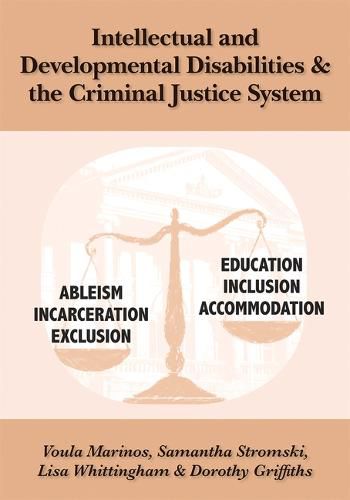Readings Newsletter
Become a Readings Member to make your shopping experience even easier.
Sign in or sign up for free!
You’re not far away from qualifying for FREE standard shipping within Australia
You’ve qualified for FREE standard shipping within Australia
The cart is loading…






Persons with Intellectual and Developmental Disabilities and the Criminal Justice System offers a multidimensional perspective for understanding the issues, dilemmas, and gaps that justice-involved persons with intellectual and developmental disabilities and their caregivers face in both the criminal justice system and community-based services in Canada, the U.S., and the U.K. Initial chapters in this book review issues such as identification, risk assessments, court supports, and accommodations as they relate to persons with intellectual and developmental disabilities; whereas, later chapters in the book are more focused on recognizing the unique issues and dilemmas that persons with ASD, FASD, and those labeled as a sex offender face in the criminal justice system and during intervention. Collectively, these chapters suggest that we need to adopt a framework that is flexible, person-centered, rights-oriented, and interdisciplinary for understanding the behaviors that bring people with intellectual and developmental disabilities to the attention of the criminal justice system and to be effective in the interventions that reduce the risk of recidivism.
$9.00 standard shipping within Australia
FREE standard shipping within Australia for orders over $100.00
Express & International shipping calculated at checkout
Persons with Intellectual and Developmental Disabilities and the Criminal Justice System offers a multidimensional perspective for understanding the issues, dilemmas, and gaps that justice-involved persons with intellectual and developmental disabilities and their caregivers face in both the criminal justice system and community-based services in Canada, the U.S., and the U.K. Initial chapters in this book review issues such as identification, risk assessments, court supports, and accommodations as they relate to persons with intellectual and developmental disabilities; whereas, later chapters in the book are more focused on recognizing the unique issues and dilemmas that persons with ASD, FASD, and those labeled as a sex offender face in the criminal justice system and during intervention. Collectively, these chapters suggest that we need to adopt a framework that is flexible, person-centered, rights-oriented, and interdisciplinary for understanding the behaviors that bring people with intellectual and developmental disabilities to the attention of the criminal justice system and to be effective in the interventions that reduce the risk of recidivism.